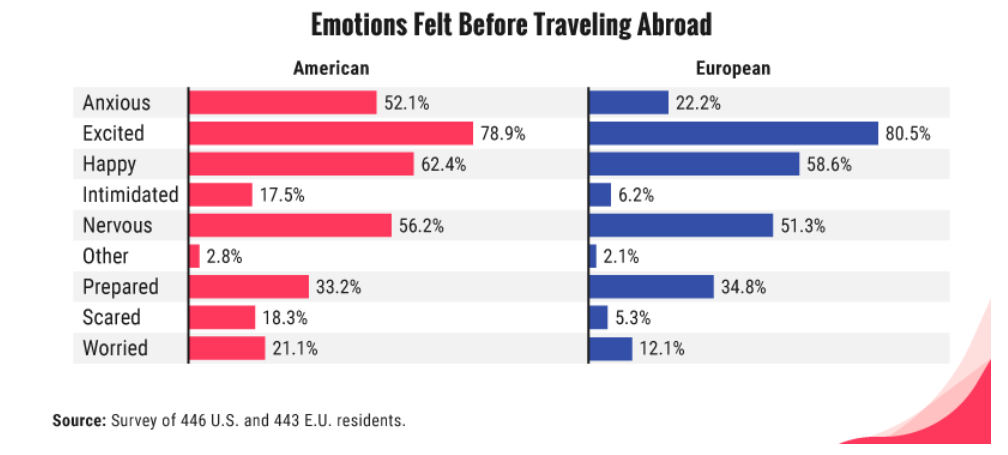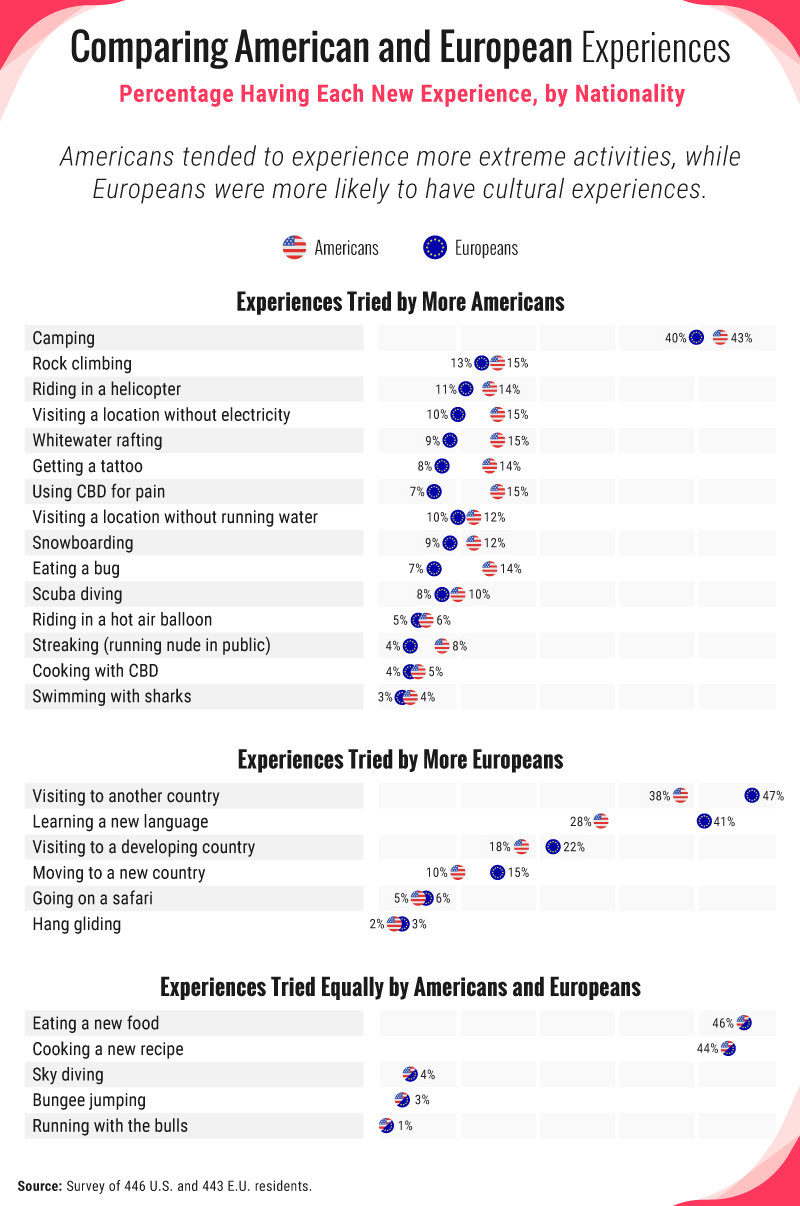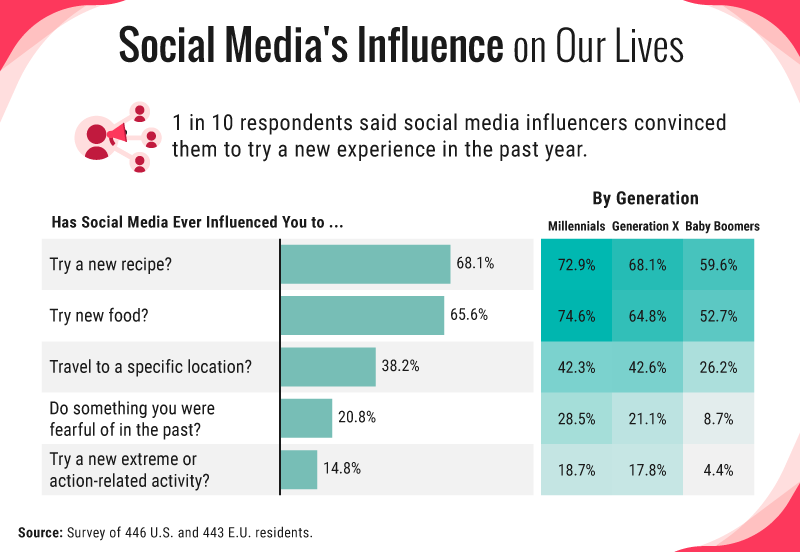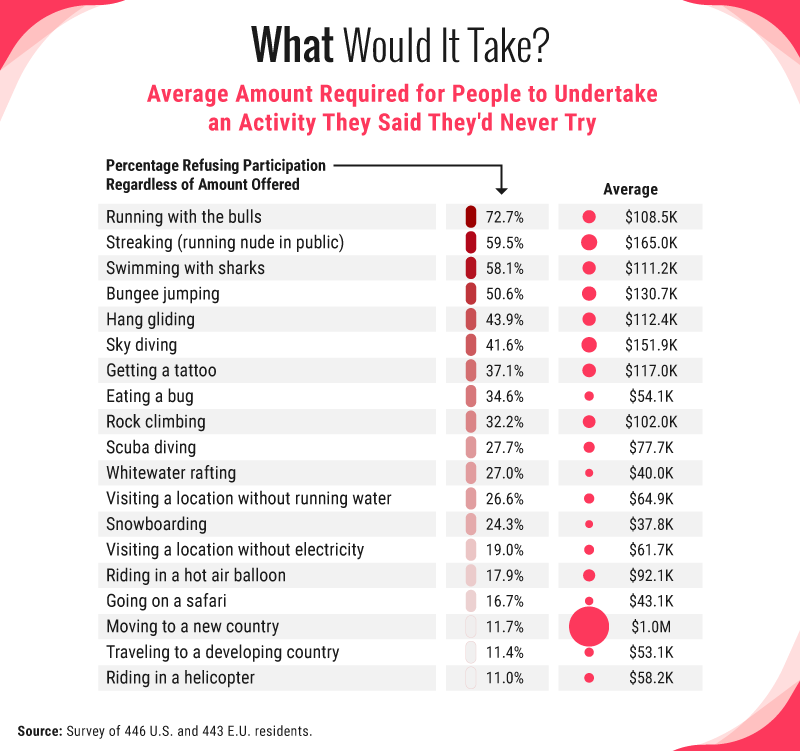Excitement dominated on either side of the Atlantic for the almost 1,000 survey respondents, split pretty equally between Americans and Europeans. Happiness and an understandable slight sense of nervousness where also strong emotions felt by both.
In fact, most emotions were fairly mirrored, except for anxiousness (52.1% versus 22.2%), being scared (18.3% versus 5.3%) or being worried (21.1% versus 12.1%), which American were much strongly weighted with American responses. Of note, almost one fifth of American respondents (17.5%) even went as far as suggesting they felt intimidated ahead of planned overseas travel, versus just 6.2% of European respondents.

Of course, exploring new experiences does not directly need to involve overseas travel. This appears the case when you consider the findings show that Americans has more new experiences in 2019 than Europeans. Americans had an average of 5.3 new experiences in the last year, compared to 3.8 for Europeans, according to the research. Additionally, regardless of nationality, millennials participated in more new activities (5.3) than Gen Xers (4.6) and baby boomers (3.4) - no real surprise when you consider the importance of experiences in their lives.
But, the research slightly contradicts that outlook and perhaps instead paints a picture that millennials want to explore, but perhaps may not have the confidence to push themselves outside of the their comfort zones. The research shows that just under half (42%) of respondents (including 38% of Americans and 46% of Europeans) wanted to try a new experience in the past year but decided against it. Interestingly, among them, 52% of millennials and roughly 35% of baby boomers and Gen Xers wanted to pursue a new adventure in 2019 but didn't.
Various recent studies have indicated that experiences make us happier than buying material items. Similarly, they are said to last longer in our memories. This is particularly the case with younger generations that appear to be closer to their values and more willing to seek new adventures and explore the uncharted path.
When it comes to experiences, It would seem, from the research, that Americans tend to be more interested in extreme activities than their European counterparts. On the flip side, Europeans are more likely to have cultural experiences.

Around two thirds (63%) of respondents said they would feel unsatisfied if they didn't travel at least once per year, and the average participant travelled for pleasure nearly three times in 2019. While almost 14% of Americans had never left the US, nearly three-quarters had travelled to at least two countries at some point. In contrast, half of Europeans had been to 10 or more countries (compared to just 13% of US respondents), and fewer than 3% had never left their resident country.
Interestingly, and reinforcing other research, the survey highlights how social media is having a profound impact on the travel industry, including the influence of social media influencers. We are constantly 'online' nowadays, but there are still clear demographic splits between those checking-in at an airport on Facebook and those seeking that perfect Instagram image.

Social media influencers are proving a successful tool for the travel industry in helping to sell destinations and experiences. Unsurprisingly, this is influencing millennials much more than any other grouping.
Overall the research indicates that one in ten has been convinced by social media influencers to try a new experience in the past year, with a trend by generation, led by millennials, ahead of Gen Xers and baby boomers.
But, when it comes to experiences just how far are people willing to push themselves, and how much would it take to convince them to undertake an activity that they said they would never try? The survey shows that running with balls, streaking, swimming with sharks and bungee jumping are all experiences that more than half of respondents would refuse, regardless of a cash incentive.
But, each of these activities does have a price for the minority, and the following chart from the research provides an interesting view of those experiences we may fear the most, but also how easily a cash incentive could change our viewpoint.
